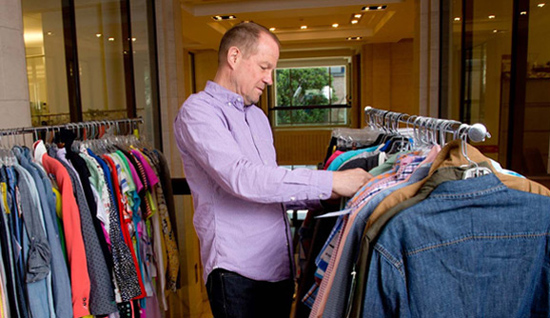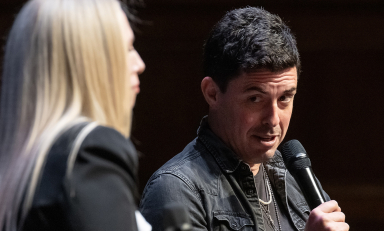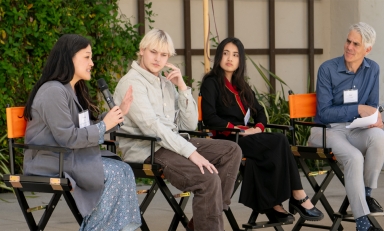Business veteran Art Peck ’77 brings his leadership acumen to the Board of Trustees at a critical juncture in higher education when the College’s mission—and messaging—are more important than ever
Forty-eight years and seven presidents ago, economics major Art Peck ’77 walked across the stage of Remsen Bird Hillside Theater, where he received his diploma from President Richard C. Gilman. When he returned to the stage on April 25 at the inauguration of Occidental’s 17th president, Tom Stritikus, it was as chair-elect of the College’s Board of Trustees—a role he never expected to fill.

“I am very grateful to my fellow trustees and to Tom for giving me the opportunity to give back to a place that has had such an impact on my life,” Peck said to the gathering. “As I have become reacquainted with the College, it’s clear—and not surprising—that some things have changed over half a century. … But it’s also clear what hasn’t changed—and in my mind, what is of singular importance: Occidental, powered by its amazing faculty, remains committed to teaching students how to think critically.”
Having worked with Stritikus over the last year, Peck—who chaired the search committee to identify the person best suited to lead Occidental at a critical juncture in higher education—reaffirmed his support. “Tom is an outstanding president for Occidental,” he says, adding that he looks forward to their continued interaction in Peck’s new role as Board chair, a three-year appointment that began July 1.
“It’s a challenging but exciting time in higher education and for the College,” Peck says. “In a time of uncertainty among colleges and universities around the country, higher education is a national asset currently under attack, and we all have a responsibility to help protect that asset. As beneficiaries of the education that we got at Occidental, we need to all think about why this matters, and why we have an obligation to raise our voice.”
After graduating from Oxy, Peck enrolled at Harvard Business School, completing his MBA in 1979. He spent 23 years at Boston Consulting Group before joining Gap Inc., the multinational clothing retailer, in 2005. Nine years later, he was named president and CEO, a position he held until 2019. Peck is currently co-founder and executive chair of The Great., a fast-growing women’s apparel and lifestyle brand led by his “amazing” co-founders, Emily Current and Meritt Elliott.

Reflecting on his time at Gap, Peck says, “I am proud of the positive change I was able to achieve and to be able to demonstrate that doing good and good business can go hand in hand.” Peck sponsored the founding of the PACE (Personal Achievement & Career Enhancement) program to invest in the women in the communities where Gap clothes are made, providing life skills education to help them reach their full potential. The program has reached more than 1 million women since its inception.
In 2014, Gap was the first Fortune 500 company to announce equal pay for equal work, with its methodology and data independently validated by a leading gender and diversity firm. As CEO, Peck adds, “We rebooted DEI to a very simple commitment, that the composition of our workforce would reflect the communities we lived and worked in—from part-time seasonal sales associate in our stores to the senior leadership team. That seemingly simple commitment provided a focus that many inclusion efforts are often missing and was immediately impactful from the stores all the way up through the company.”
Peck joined the Board of Trustees at the invitation of then-President Jonathan Veitch in early 2020—seven years after he was first approached about joining. Soon after, Harry J. Elam, Jr. was selected as president and the pandemic hit. Meeting over Zoom, “It was like Hollywood Squares in terms of getting to know my fellow Board members,” Peck says. “But over the last five years, I have gotten to know Occidental in its modern expression, at a time when what the College does is more important than ever.”
When Elam announced in 2023 that he was going to step down after being diagnosed with Parkinson’s, Peck was asked to lead the presidential search committee. He accepted the role and soon learned that the search process in higher education varies dramatically from the C-suite.
“Coming from a corporate environment, if I’m going to hire a senior executive, I have a search firm, I meet some candidates, maybe have them meet a couple other senior executives and board members, and we get it done,” he explains. “The presidential search obviously was a process that needed to embrace the whole Oxy community. We had 20 people on the committee—trustees, alumni, staff, students, and faculty—but our group came together with a common purpose very quickly and it was an exhilarating example of community collaboration.” From start to finish, the search took a brisk five months: “I don’t know if that’s record time, but we managed to be efficient and very successful in bringing in a stellar new president.”
With his business and marketing experience, Peck is looking forward to partnering with Stritikus to address challenges facing liberal arts colleges, such as enrollment. As an institution that relies primarily on tuition, room, and board to meet its annual budget, “It is critically important that Occidental continue to meet its enrollment goals,” Peck says. As part of this, he sees “an enormous opportunity” to tell the Occidental story to cohorts of high school students in places where awareness of the College is low. “When I ran the Gap brand, my job wasn’t to market this new retailer that sold jeans and T-shirts—I mean, pretty much everybody on the planet knows the Gap—but we had to convince people that it was relevant again,” he continues. “The task at Occidental is exactly the opposite: The College is extraordinarily relevant, but it is way less known than it deserves to be—this ‘hidden jewel’ thing.”
The good news, he says,is that Occidental “has incredible stories to tell,” citing everything from faculty excellence and postgraduate admission rates to immersive learning opportunities and connections to the Greater Los Angeles community—the second-largest city in the United States in a state that is the fourth-largest economy in the world. As parents of two Oxy graduates, Peck and his wife, Kirsten Frank ’79, can attest to the ongoing benefits of an Oxy education. “Oxy has an academic culture and set of course offerings that have continued to evolve and be relevant for a wide range of careers,” he says. “It is imperative to tell our story with a loud and proud voice.”
Peck looks forward to engaging with the Board of Trustees, which oversees the policies, strategies, and finances of the College. In terms of its size and composition, the 36-member Board “is wonderfully functional,” Peck says, pointing to the group’s diversity in age, race, gender, and experience, with alumni ranging from the 1960s to the 2000s; parents spanning four decades; emeriti faculty; and friends of the College. “That combination is really powerful, and the diversity of people that we have is really important.” (Under a recently amended set of College bylaws, a Board-elected trustee may serve no more than 12 consecutive years but may be re-elected to a new term after a one-year hiatus.)
In addition, Peck says, “Trustees discuss differences respectfully, politely, and constructively. This is a testament to the leadership before me”—namely, past chairs Susan Mallory ’76 M’78, Steve Rountree ’71, and Lisa Link P’18. “That doesn’t mean that we don’t have tough conversations, or that people don’t disagree,” he adds. “But everybody is here to support student outcomes, which is the reason Occidental exists.”
At the trustees’ most recent meeting in June, “I said that part of a board’s job is to look around corners and see what’s coming,” Peck recalls. “Another part is to support the president and the senior team in taking risk and going after opportunity.
“It might have seemed somewhat of an impertinent conversation,” he admits, “but there is a theory in evolutionary biology called punctuated equilibrium. Basically, it says that evolution is not a smooth, continuous process but rather happens in bursts at times when species are under environmental stress.” (“I’m looking forward to being corrected by our outstanding biology faculty,” he adds with a smile.)
“In organizations, change typically happens when there’s stress in the environment,” he continues. “When everything is great, nobody has any incentive to change. But when there is stress, you either adapt or you fail. There’s no doubt that there’s stress in the environment right now. I just see it as a time for Occidental to embrace some positive change that will benefit the entire College community.”
Looking at the task ahead, Peck admits, “It’s either a terrible time or a wonderful time to be on the Board. I am an optimist and choose to say it’s a wonderful time because it’s a time of incredible opportunity.”




